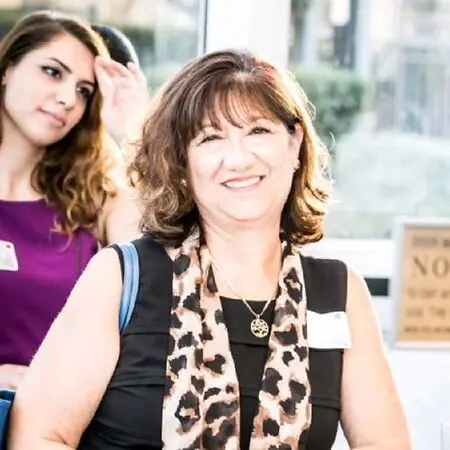Patti Castro

Patti Castro is a seasoned workforce development professional, instructor, and leader with decades of experience shaping programs that empower communities and advance economic opportunity. Currently serving on the Leadership Team and as a Consultant with the California Workforce Association, Patti brings extensive expertise in public policy development, workforce partnerships, and business engagement strategies. She serves as a Commissioner for the Alameda County Commission on the Status of Women & Girls and as an advisor to the Bay Area Council’s Workforce of the Future Committee, leveraging her deep network to connect businesses, labor organizations, and educational institutions across the region. Throughout her distinguished career, Patti served as Executive Director of the Alameda County Workforce Development Board for nearly three decades, leading a 27-member policy board and managing large-scale workforce initiatives. She has designed and implemented regional workforce programs, forged strategic partnerships, and guided diverse teams to achieve measurable outcomes for jobseekers, employers, and communities. Her work has consistently emphasized equity, collaboration, and results-driven leadership, leaving a legacy of robust programs and a well-trained cadre of workforce professionals. A committed mentor and educator, Patti has taught workforce development professionals at California State University, Sacramento, and supports high-risk youth, first-generation immigrant students, and formerly incarcerated individuals through apprenticeship and college prep programs. Recognized as Woman of the Year in 2023 for her community impact, she remains a dynamic connector and trusted leader in the Bay Area, blending credibility, compassion, and a passion for building opportunities that create lasting benefits for individuals and communities alike.
• Holy Names University - BA
• Woman of the Year in 2023
• California Workforce Association
• Board Member, Tri-CED Community Recycling
What do you attribute your success to?
I attribute my success to the foundation I gained from a liberal arts education, which gave me the flexibility to grow, adapt, and lead programs across government, education, business, and nonprofit sectors. I also feel my inter-disciplinary studies gave me a strong foundational understanding of people, culture, behaviors and political thought. I used this knowledge every day of my career. I am deeply grateful for the incredible mentors I had as a young manager—people who trusted me, taught me to communicate confidently in male-dominated spaces, and encouraged me to stay curious. My passion for people and my natural role as a connector has allowed me to build genuine relationships across sectors and industries, which has been key to thriving over the past four decades. I am driven by a lifelong commitment to economic opportunity, equity, and uplifting people and communities that are often overlooked.
What’s the best career advice you’ve ever received?
The best career advice I’ve ever received is to surround myself with strong, capable people—and to trust them. Early in my career, I learned that a leader is only as effective as their team, and that confidence and professionalism are essential, especially when navigating industries where women are often not taken seriously. And, to stay measured.
What advice would you give to young women entering your industry?
My advice to young women entering this industry is to find mentors early and seek guidance from people who truly believe in you. Take the time to learn the ecosystem, because workforce development touches every sector. Always show up professionally and confidently, even if you’re the only woman in the room, and build relationships intentionally—partnerships are everything in this field. I also encourage exploring apprenticeships and two-year technical education programs which are powerful pathways for young people. I want women to know that you don’t need a traditional path to make a lasting impact—you just need passion, persistence, and purpose.
What are the biggest challenges or opportunities in your field right now?
Some of the biggest challenges in my field right now include helping laid off and workers reskill during rapid economic and technological shifts, aligning business needs with training programs in real time, and supporting underfunded programs that serve high-risk youth and returning citizens. Another ongoing challenge is breaking down silos between the business, education, and nonprofit sectors to create more seamless solutions. At the same time, there are tremendous opportunities to keep people working! Expanding high-quality apprenticeship pathways can lead directly to living-wage careers, while strengthening regional partnerships through intentional, community-driven relationship building can amplify impact. Workforce systems also have the power to open doors for first-generation youth and marginalized communities and to focus on workers who remain vulnerable in their current jobs. Drawing on decades of institutional knowledge, leaders who bridge multiple sectors can help drive these efforts forward. I see the future of workforce development as collaborative, inclusive, and full of potential.
What values are most important to you in your work and personal life?
The values that guide me in both my work and personal life are credibility, connection, mentorship, service, equity, and professionalism. I strive to be someone organizations can trust to deliver results, while linking businesses, nonprofits, and students to the right opportunities. Mentorship is central to my work, whether it’s guiding displaced workers, first-generation youth, or formerly incarcerated individuals.
Service and giving back to the community are lifelong commitments, and equity drives me to ensure that all people have access to good jobs and pathways to success. I also take pride in professionalism—showing up prepared, presenting myself well, and representing my community with integrity.
I aim to be warm, approachable, and dependable, serving as a steady anchor across every workforce initiative I support.
Locations
San Leandro, CA 94577
Call